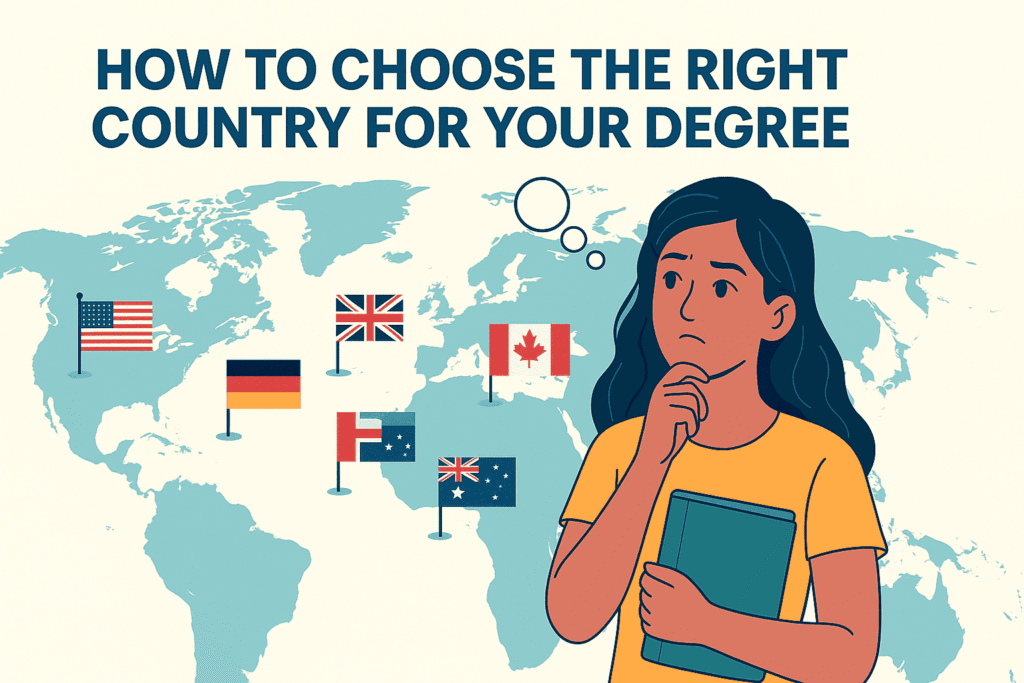Choosing the right country for your higher education can shape your academic journey, career growth, and lifestyle experience. In 2025, students have more international options than ever, but deciding where to go isn’t just about ranking—it’s about alignment with your goals, budget, and future.
This guide will help Indian students navigate the most important factors when selecting a study-abroad destination.
🌍 1. Define Your Academic Goals First
Before exploring countries, ask yourself:
-
Do you want research-heavy or application-based programs?
-
Is a flexible curriculum important?
-
Are you targeting top-ranked universities or skill-based institutions?
Countries like the USA and Germany offer diverse options, while others like Australia and Canada focus on career-linked education.
💸 2. Budget and Affordability
Understand the total cost including:
-
Tuition fees
-
Living expenses
-
Health insurance
-
Travel and visa
For example:
-
Germany offers tuition-free education in public universities.
-
Canada and the UK have shorter programs, potentially reducing costs.
-
USA offers higher tuition but generous scholarship opportunities.
Tip: Always calculate in INR for easier planning.
🎓 3. Availability of Your Desired Program
Each country has its academic specialties:
| Country | Known For |
|---|---|
| USA | STEM, Business, Liberal Arts |
| UK | Law, Literature, Social Sciences |
| Canada | Engineering, Environmental Sciences |
| Germany | Mechanical, Automotive, Engineering |
| Australia | Hospitality, Healthcare, Environmental Science |
Make sure the country offers strong programs in your field with global recognition.
🌐 4. Language and Communication
-
Is English the primary medium?
-
Will you need to learn a new language?
For Indian students:
-
USA, UK, Canada, Australia, Ireland: English-speaking, no language barrier
-
Germany, France, Japan: May require learning the local language for daily life or job prospects
🔐 5. Post-Study Work and PR Opportunities
Think long-term. Does the country allow:
-
Work visas after graduation?
-
Pathway to permanent residency?
Example:
-
Canada offers 2–3 years of post-study work permits
-
Germany allows 18 months to find a job after graduation
-
UK allows 2 years of work under the Graduate Route
Always check official government websites:
-
Canada: https://www.canada.ca
-
Germany: https://www.make-it-in-germany.com
-
Australia: https://immi.homeaffairs.gov.au
🏙️ 6. Lifestyle, Culture & Safety
Each country offers a different experience:
-
Climate – cold (Canada) vs. mild (Australia)
-
Culture – conservative (Germany) vs. multicultural (UK, Canada)
-
Food – Availability of vegetarian/Indian food?
-
Community – Presence of Indian students and associations?
Check expat blogs or connect with students on LinkedIn and Instagram to get real-life insights.
📆 7. Admission Cycle and Visa Processing
Plan your application according to timelines:
| Country | Intake Months |
|---|---|
| USA | August (Fall), January (Spring) |
| UK | September, January |
| Canada | January, May, September |
| Germany | April, October |
| Australia | February, July |
Note: Visa processing can take 4–12 weeks depending on the country.
🤝 8. Scholarship Availability
If you depend on scholarships, prioritize countries with:
-
Government-funded scholarships
-
University-specific grants
-
Need-based or merit-based opportunities
👉 See our guide: How to Find Scholarships for Indian Students – Step-by-Step
🔍 9. Job Prospects After Graduation
Research:
-
In-demand industries in the country
-
Internship opportunities
-
Part-time work rules (typically 20 hours/week during studies)
Use platforms like:
✅ 10. Align with Your Long-Term Goals
Think of your 5-10 year plan:
-
Do you want to return to India or settle abroad?
-
Are you looking for international work experience?
-
Are you aiming for immigration?
Let your vision guide your country selection—not trends or peer pressure.
🎯 Conclusion: There’s No One-Size-Fits-All
The best country for your degree depends on your:
-
Field of study
-
Financial capacity
-
Career ambitions
-
Lifestyle preferences
Do your research, speak to alumni, attend virtual university fairs, and explore official embassy websites.
📌 Bonus Tip:
Start shortlisting 2–3 countries early and compare:
-
University rankings
-
Course curriculum
-
Visa rules
-
Job market
This clarity will simplify your application journey.

